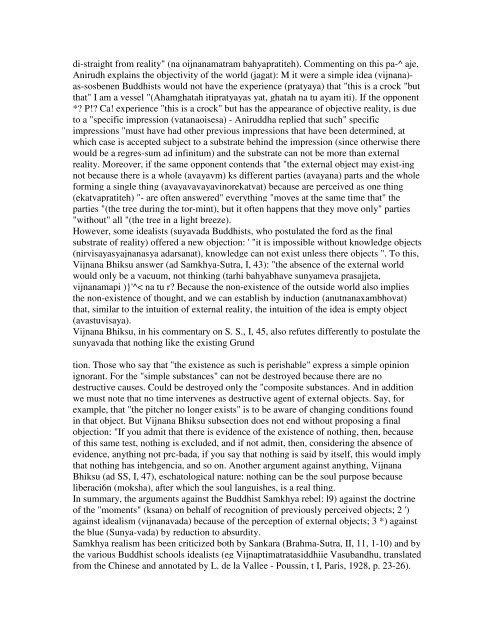Mircea Eliade YOGA IMMORTALITY AND ... - Brihaspati.net
Mircea Eliade YOGA IMMORTALITY AND ... - Brihaspati.net
Mircea Eliade YOGA IMMORTALITY AND ... - Brihaspati.net
Create successful ePaper yourself
Turn your PDF publications into a flip-book with our unique Google optimized e-Paper software.
di-straight from reality" (na oijnanamatram bahyapratiteh). Commenting on this pa-^ aje,<br />
Anirudh explains the objectivity of the world (jagat): M it were a simple idea (vijnana)as-sosbenen<br />
Buddhists would not have the experience (pratyaya) that "this is a crock "but<br />
that" I am a vessel "(Ahamghatah itipratyayas yat, ghatah na tu ayam iti). If the opponent<br />
*? P!? Ca! experience "this is a crock" but has the appearance of objective reality, is due<br />
to a "specific impression (vatanaoisesa) - Aniruddha replied that such" specific<br />
impressions "must have had other previous impressions that have been determined, at<br />
which case is accepted subject to a substrate behind the impression (since otherwise there<br />
would be a regres-sum ad infinitum) and the substrate can not be more than external<br />
reality. Moreover, if the same opponent contends that "the external object may exist-ing<br />
not because there is a whole (avayavm) ks different parties (avayana) parts and the whole<br />
forming a single thing (avayavavayavinorekatvat) because are perceived as one thing<br />
(ekatvapratiteh) "- are often answered" everything "moves at the same time that" the<br />
parties "(the tree during the tor-mint), but it often happens that they move only" parties<br />
"without" all "(the tree in a light breeze).<br />
However, some idealists (suyavada Buddhists, who postulated the ford as the final<br />
substrate of reality) offered a new objection: ' "it is impossible without knowledge objects<br />
(nirvisayasyajnanasya adarsanat), knowledge can not exist unless there objects ". To this,<br />
Vijnana Bhiksu answer (ad Samkhya-Sutra, I, 43): "the absence of the external world<br />
would only be a vacuum, not thinking (tarhi bahyabhave sunyameva prasajjeta,<br />
vijnanamapi )}'^< na tu r? Because the non-existence of the outside world also implies<br />
the non-existence of thought, and we can establish by induction (anutnanaxambhovat)<br />
that, similar to the intuition of external reality, the intuition of the idea is empty object<br />
(avastuvisaya).<br />
Vijnana Bhiksu, in his commentary on S. S., I, 45, also refutes differently to postulate the<br />
sunyavada that nothing like the existing Grund<br />
tion. Those who say that "the existence as such is perishable" express a simple opinion<br />
ignorant. For the "simple substances" can not be destroyed because there are no<br />
destructive causes. Could be destroyed only the "composite substances. And in addition<br />
we must note that no time intervenes as destructive agent of external objects. Say, for<br />
example, that "the pitcher no longer exists" is to be aware of changing conditions found<br />
in that object. But Vijnana Bhiksu subsection does not end without proposing a final<br />
objection: "If you admit that there is evidence of the existence of nothing, then, because<br />
of this same test, nothing is excluded, and if not admit, then, considering the absence of<br />
evidence, anything not prc-bada, if you say that nothing is said by itself, this would imply<br />
that nothing has intehgencia, and so on. Another argument against anything, Vijnana<br />
Bhiksu (ad SS, I, 47), eschatological nature: nothing can be the soul purpose because<br />
liberaci6n (moksha), after which the soul languishes, is a real thing.<br />
In summary, the arguments against the Buddhist Samkhya rebel: l9) against the doctrine<br />
of the "moments" (ksana) on behalf of recognition of previously perceived objects; 2 ')<br />
against idealism (vijnanavada) because of the perception of external objects; 3 *) against<br />
the blue (Sunya-vada) by reduction to absurdity.<br />
Samkhya realism has been criticized both by Sankara (Brahma-Sutra, II, 11, 1-10) and by<br />
the various Buddhist schools idealists (eg Vijnaptimatratasiddhiie Vasubandhu, translated<br />
from the Chinese and annotated by L. de la Vallee - Poussin, t I, Paris, 1928, p. 23-26).







